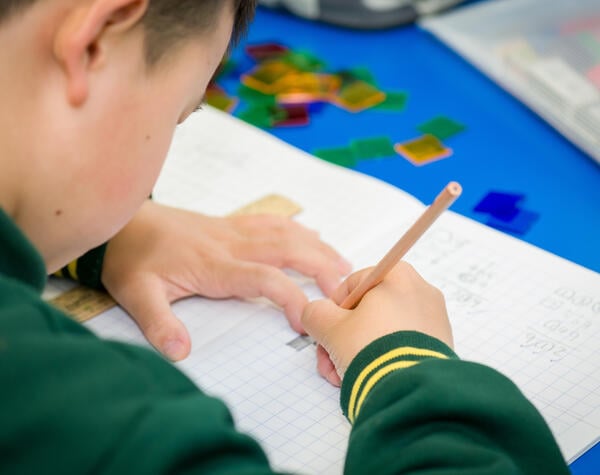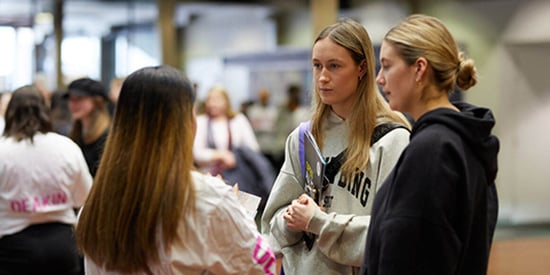#1 in Australia for education and educational research*
#5 in the world for education and educational research*
Gain the professional requirements to teach in IB PYP schools
Key facts
Duration
1 year part-time
Locations
Current Deakin Students
To access your official course details for the year you started your degree, please visit the handbook
Course overview
The Graduate Certificate of Education (International Baccalaureate PYP Early Years) is aimed at providing current early childhood and/or Primary teachers with the specialist skills, knowledge and theoretical understanding of the IB PYP, with a specific focus on the early years (children 3-8 years). Graduates of this course will be able to apply for recognition by the IBO as having met the expected professional learning requirements to teach in an IB PYP school.
The Course consists of units which covers Inquiry Learning Through the International Baccalaureate (PYP), which introduces students to the IB PYP from a theoretical and practice-based understanding:
- The Inquiring Child: The Role of Play in Children's Learning, explores the connections between contemporary, research-based thinking on theories of play and inquiry practice in the early years and the IB PYP, and teachers’ own pedagogical approaches and experiences;
- Assessing and Documenting Learning in the Global Early Years Context, analyses the role of assessment in contexts of play, relationships, environment and symbolic learning in early years education drawing in global perspectives and contemporary perspectives; and
- Planning for Inquiry Learning: Professional Practice and Portfolio is a praxis unit which provides students with the opportunity to connect the theoretical understanding of the IB PYP pedagogy and approaches with practical opportunities to enact planning, teaching and assessment in an IN PYP (Early Years) setting.
Through undertaking 15-days fieldwork in an IB PYP (Early Years) students will work in collaboration with experienced IB PYP (Early Years) teachers to plan, teach and assess a unit of inquiry.
Read MoreCourse information
- Award granted
Graduate Certificate of Education (International Baccalaureate PYP Early Years)
- Year
2024 course information
- Deakin code
- E511
- Level
- Postgraduate (Graduate Certificate and Graduate Diploma)
- Australian Qualifications Framework (AQF) recognition
The award conferred upon completion is recognised in the Australian Qualifications Framework at Level 8.
Course structure
To complete the Graduate Certificate of Education (International Baccalaureate PYP Early Years), students must attain 4 credit points.
The course comprises a total of 4 credit points including:
- 4 credit points of core units (EIB701, EIB702, EIB703, EIB704)
- DAI001 Academic Integrity Module (0-credit-point compulsory unit)
Students are required to meet the University's academic progress and conduct requirements.
Intakes by location
The availability of a course varies across locations and intakes. This means that a course offered in Trimester 1 may not be offered in the same location for Trimester 2 or 3. Check each intake for up-to-date information on when and where you can commence your studies.
Trimester 1 (part-time only) - March
- Start date: March
- Available at:
- Online
Additional course information
Course duration
Course duration may be affected by delays in completing course requirements, such as accessing or completing work placements.
Mandatory student checks
Any unit which contains work integrated learning, a community placement or interaction with the community may require a police check, Working with Children Check or other check.
Workload
Students will on average spend 150-hours over the teaching period for each credit point undertaking required teaching, learning and assessment activities.
Participation requirements
Reasonable adjustments to participation and other course requirements will be made for students with a disability. More information available at Disability support services.
Entry requirements
Selection is based on a holistic consideration of your academic merit, work experience, likelihood of success, availability of places, participation requirements, regulatory requirements, and individual circumstances. You will need to meet the minimum academic and English language proficiency requirements to be considered for selection, but this does not guarantee admission.
Academic requirements
To be considered for admission to this degree you will need to meet the following criteria:
- completion of a bachelor degree or higher in either early childhood education or primary education
English language proficiency requirements
To meet the English language proficiency requirements of this course, you will need to demonstrate at least one of the following:
- IELTS (Academic): minimum overall band of 7.0 (with no individual band less than 7.0) speaking and listening 7.5
- TOEFL iBT: minimum overall score of 102 (with minimum score of 24 in reading and speaking, 27 in listening and writing)
- PTE Academic: minimum score of 65 (with no communication band less than 65) speaking and listening 73
English-speaking education:
- completion of a bachelor degree in a recognised English-speaking country with a WAM of at least 60 or completion of DUELI English for Teaching program
- professional recognition: completion of a bachelor degree or higher in the field of education that is a recognised initial teacher qualification for the purpose of registration as an early childhood or primary teacher in Australia
Admissions information
Learn more about Deakin courses and how we compare to other universities when it comes to the quality of our teaching and learning.
Not sure if you can get into Deakin postgraduate study? Postgraduate study doesn’t have to be a balancing act; we provide flexible course entry and exit options based on your desired career outcomes and the time you are able to commit to your study.
Recognition of prior learning
If you have completed previous studies which you believe may reduce the number of units you have to complete at Deakin, indicate in the appropriate section on your application that you wish to be considered for credit transfer. You will need to provide a certified copy of your previous course details so your credit can be determined. If you are eligible, your offer letter will then contain information about your credit transfer. Your credit transfer is formally approved prior to your enrolment at Deakin during the Enrolment and Orientation Program. You must bring original documents relating to your previous study so that this approval can occur.
You can also refer to the Recognition of prior learning system which outlines the credit that may be granted towards a Deakin University degree.
Fees and scholarships
Fee information
The 'Estimated tuition fee' is provided as a guide only based on a typical enrolment of students completing this course within the same year in which they started. The cost will vary depending on the units you choose, your study load, the length of your course and any approved Recognition of prior learning you have.
The 'Estimated tuition fee' is calculated by adding together four credit points of study. Four credit points is used as it represents a typical enrolment load for a Graduate Certificate.
Each unit you enrol in has a credit point value. You can find the credit point value of each unit under the Unit Description by searching for the unit in the Handbook.
Learn more about tuition fees.
Scholarship options
A Deakin scholarship might change your life. If you've got something special to offer Deakin – or you just need the financial help to get you here – we may have a scholarship opportunity for you.
Postgraduate bursary
If you’re a Deakin alumnus commencing a postgraduate award course, you may be eligible to receive a 10% reduction per unit on your enrolment fees.
Apply now
Applications can be made directly to the University through StudyLink Connect - Deakin University's International Student Application Service. For information on the application process and closing dates, see the How to apply web page.
Fill out the application form and submit to a Deakin International office or take your application form to a Deakin representative for assistance
For information on the application process and closing dates, see the How to apply webpage.
If you’re still having problems, please contact Deakin International for assistance.
Careers
Career outcomes
The Graduate Certificate of Education (International Baccalaureate PYP Early Years) will provide graduates with the required skills, knowledge and underpinning theory of the IB PYP Program and the IBO will recognise graduates as meeting the professional requirements to teach in an IB YP school. The IB PYP is a globally recognised curriculum and accredited IB PYP schools can be found both in Australia and across many countries in North America, Europe and Asia. Additionally, there is an increasing number of schools across Asia applying to become IBO accredited schools, resulting in the need for increasing opportunities for suitably qualified teachers to address the employment needs. As a professional post graduate qualification, the Graduate Certificate of Education (International Baccalaureate PYP Early Years) provides an opportunity for current early childhood and primary school teachers to build on their existing qualifications to gain this additional specialisation which will result in further employment opportunities for graduates both in Australia and internationally, as well as attract students internationally who need to undertake the professional learning necessary to be employed in an IB PYP school. Furthermore, the course design as a Graduate Certificate can also lead to a Master of Education, providing additional opportunities for current teachers seeking to build their professional skills and understanding.
Course learning outcomes
Deakin's graduate learning outcomes describe the knowledge and capabilities graduates can demonstrate at the completion of their course. These outcomes mean that regardless of the Deakin course you undertake, you can rest assured your degree will teach you the skills and professional attributes that employers value. They'll set you up to learn and work effectively in the future.
| Deakin Graduate Learning Outcomes | Course Learning Outcomes |
| Discipline-specific knowledge and capabilities | Contribute to critical, professional debates about education theory in a global context as it applies to early years curriculum and pedagogy and ethical codes and standards, and these understandings to inform their own practice as a global early educator. |
| Communication | Apply critical thinking, pedagogical and effective interpersonal, oral, written and multimodal communication skills to demonstrate empathy, foster learner agency, establish positive and inclusive internationally minded learning environments, and build effective professional collaborative partnerships and trust with teaching colleagues, families and other stakeholders |
| Digital literacy | Act in accordance with the ethical and legal frameworks and policy that inform responsible and ethical practice in digital environments, and critically discuss, evaluate and employ a range of appropriate digital literacies, resources and technologies for professional/community/learner engagement and agency. |
| Critical thinking | Engage with contemporary critical and professional debates regarding global education trends, theory, policy and research and use these understandings to critically reflect on and evaluate own teaching practices and diverse learning data sets to make informed evidence-based judgements for enhancements and innovations to improve learner agency and outcomes. |
| Problem solving | Collaboratively and independently use evidence and research to identify, prioritise and creatively respond to problems that arise in professional learning and practice. |
| Teamwork | Actively and collaboratively participate in, and/or lead learning communities, involving learners, families, community members, colleagues and the broader profession to deepen understandings of global education and international mindedness to optimise learning and learner outcomes |
| Global citizenship | Engage in research and professional collaborations to develop informed positions on and approaches to internationally minded educational transformation as applied to learner agency and global citizenship; Indigenous and intercultural issues; global education trends and issues; and, social justice and sustainability. |
| Approved by Faculty Board October 2021 | |
Events Explore more events
Footnotes
* U.S. News & World Report, Best Global Universities Subject Rankings 2022–2023




